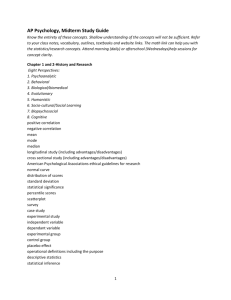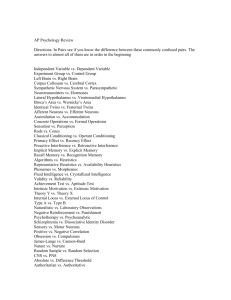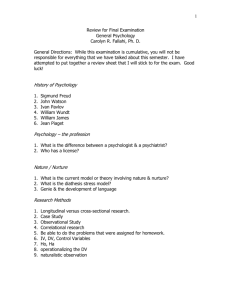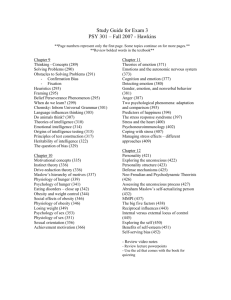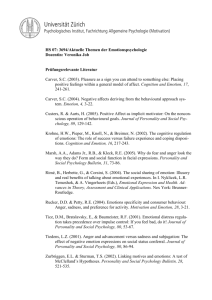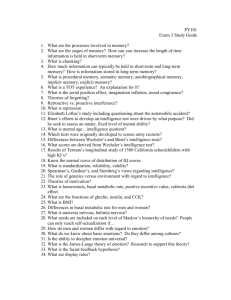Famous Psychologists
advertisement
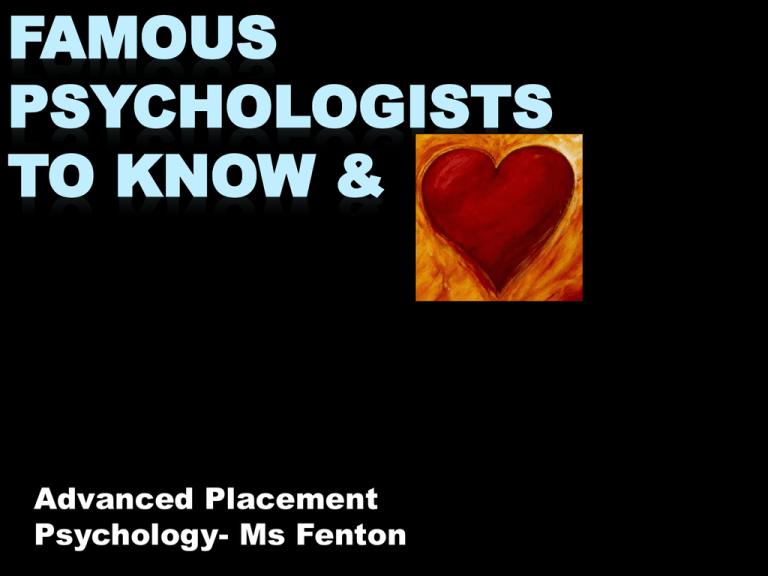
FAMOUS PSYCHOLOGISTS TO KNOW & Advanced Placement Psychology- Ms Fenton • Founder of • Behaviorism Little Albert study • UCS • NS • CR UCR CS • Classical • Conditioning of fear Discrimination & Generalization of fears John Watson • Founder of • Behaviorism Little Albert study • UCS • NS • CR UCR CS • Classical • Conditioning of fear Discrimination & Generalization of fears • Bobo Doll • Observational / • • • • Social Learning Modeling Social-Cognitive Perspective of personality Reciprocal Determinism Self-efficacy Albert Bandura • Bobo Doll • Observational / • • • • Social Learning Modeling Social-Cognitive Perspective of personality Reciprocal Determinism Self-efficacy • Cognitive Therapist • Rational Emotive Therapy (RET and REBT) • Alter client’s irrational thinking to reduce maladaptive behavior & emotions • ABC Activating Event Beliefs About Event Consequences Albert Ellis • Cognitive Therapist • Rational Emotive Therapy (RET and REBT) • Alter client’s irrational thinking to reduce maladaptive behavior & emotions • ABC Activating Event Beliefs About Event Consequences • Stanford Prison Study • Social roles and behavior • Power of the Situation • “New research - altruism Phillip Zimbardo • Stanford Prison Study • Social roles and behavior • Power of the Situation • “New research - altruism • Humanist • Hierarchy of • • Needs Lower level needs dominate higher level needs Goal - be selfactualized Abraham Maslow • Humanist • Hierarchy of • • Needs Lower level needs dominate higher level needs Goal - be selfactualized • • • • • Humanist • • Non directive therapy Focus on healthy individuals Personal growth Self-concept Congruence vs. Incongruent selfconcept A.G.E. Acceptance – unconditional positive regard Genuineness Empathy - • • Client or Person Centered Therapy Active listening Carl Rogers • • • • • Humanist • • Non directive therapy Focus on healthy individuals Personal growth Self-concept Congruence vs. Incongruent selfconcept A.G.E. Acceptance – unconditional positive regard Genuineness Empathy - • • Client or Person Centered Therapy Active listening • Cognitive Dissonance: • • inconsistency among beliefs or behaviors causes tension. Usually leads people to change beliefs to fit their actual behavior Experiment – knob turning $1 vs. $20 Leon Festinger • Cognitive Dissonance: • • inconsistency among beliefs or behaviors causes tension. Usually leads people to change beliefs to fit their actual behavior Experiment – knob turning $1 vs. $20 • Psychoanalysis • 3 Part Personality: Id, Ego, Superego • Psychosexual Stages of Development (Only Awesome Patriots Learn Guitar) • Fixations • Defense Mechanisms • Manifest & Latent Content • Free Association • Dream Analysis • Illness – caused by unresolved unconscious conflicts often from childhood Sigmund Freud • Psychoanalysis • 3 Part Personality: Id, Ego, Superego • Psychosexual Stages of Development (Only Awesome Patriots Learn Guitar) • Fixations • Defense Mechanisms • Manifest & Latent Content • Free Association • Dream Analysis • Illness – caused by unresolved unconscious conflicts often from childhood • Classical conditioning • UCS elicits a UCR Dogs • Salivation to meat powder & tuning fork • UCS, UCR, CS, CR • Acquisition, Extinction, Generalization, Discrimination, Ivan Pavlov • Classical conditioning • UCS elicits a UCR Dogs • Salivation to meat powder & tuning fork • UCS, UCR, CS, CR • Acquisition, Extinction, Generalization, Discrimination, • • • • • • Schema (Assimilation v. Accommodation) Discontinuity (Stages) Cognitive Development Sensorimotor (no object permanence) Preoperational (CANT conserve, egocentric, pre-logical, animism) Concrete Operational (can conserve) Formal Operational (abstract thought) Jean Piaget • • • • • • Schema (Assimilation v. Accommodation) Discontinuity (Stages) Cognitive Development Sensorimotor (no object permanence) Preoperational (CANT conserve), egocentric, pre-logical, animism) Concrete Operational (can conserve) Formal Operational (abstract thought) Piaget v. Vygotsky on Cognitive Development Moral • • • Development Preconventional morality Conventional morality Postconventional morality Lawrence Kohlberg Moral • • • Development Preconventional morality Conventional morality Postconventional morality • Well known • • Depression Inventory Challenge Irrational Beliefs Negative Cognitive Triad Aaron Beck • Well known Depression Inventory • Challenge Irrational Beliefs • Negative Cognitive Triad Conformity Under certain conditions, people will agree with the group’s (conform) judgment, even when it is clearly incorrect. 70% of participants in experimental group went along with the incorrect reponse at some point Line study Solomon Asch Conformity Under certain conditions, people will agree with the group’s (conform) judgment, even when it is clearly incorrect. 70% of participants in experimental group went along with the incorrect reponse at some point Line study Sociocultural theory Scaffolding Zone of proximal development Continuity theory of development Acquisition on new knowledge dependent on previous knowledge Lev Vygotsky Sociocultural theory Scaffolding Zone of proximal development Continuity theory of development Acquisition on new knowledge dependent on previous knowledge • Collective • • • • unconscious Archetypes Anima and Animus Introversion v Extroversion NeoFreudian Carl Jung • Collective • • • • unconscious Archetypes Anima and Animus Introversion v Extroversion NeoFreudian • Obedience to authority • Shocks • 65% of teachers went all the • • way PRESSENCE OF SOMEONE ELSE WHO DISOBEYS increases disobedience Know factors that increase obedience: Stanley Milgram • Obedience to authority • Shocks • 65% of teachers went all the • • way PRESSENCE OF SOMEONE ELSE WHO DISOBEYS increases disobedience Know factors that increase obedience: • Neo-Freudian • Individual psychology • Striving for Superiority • Inferiority complex • Sibling rivalry • Birth order Alfred Adler • Neo-Freudian • Individual psychology • Striving for Superiority • Inferiority complex • Sibling rivalry • Birth order • Early studies in • • • • • • Memory did research with himself as sole subject Nonsense syllables Learning Curve Forgetting Curve Overlearning Spacing Effect Hermann Ebbinghaus • Early studies in • • • • • • Memory did research with himself as sole subject Nonsense syllables Learning Curve Forgetting Curve Overlearning Spacing Effect • Confabulation or • • • False Memory Challenges eyewitness testimony Reconstructive Nature of Memory Misinformation Effect Elizabeth Loftus • Confabulation or • • • False Memory Challenges eyewitness testimony Reconstructive Nature of Memory Misinformation Effect • g factor= general • • • ability S factor = specific abilities Mental talents highly correlated Early advocate of “More than one type of Intelligence” Charles Spearman • g factor= general • • • ability S factor = specific abilities Mental talents highly correlated Early advocate of “More than one type of Intelligence” Nobel Prize winner in medicine for work with split brain patients Split patient’s corpus collosum Tried to help patients with epilepsy Lateralization of function Roger Sperry Nobel Prize winner in medicine for work with split brain patients Split patient’s corpus collosum Tried to help patients with epilepsy Lateralization of function Studied under Roger Sperry continued research on split brain patients Work on lateralization of function Interested in how the hemispheres communicate Michael Gazzaniga Studied under Roger Sperry continued research on split brain patients Work on lateralization of function Interested in how the hemispheres communicate • Neo-Freudian • Basic Anxiety • Womb Envy Healthy Personality = combo of Moving Toward Moving Against Moving Away Karen Horney (horn-eye) • Neo-Freudian • Basic Anxiety • Womb Envy Healthy Personality = combo of Moving Toward Moving Against Moving Away • Revised Simon Binet • • • IQ test for American children Revision known as the STANFORDBINET longitudinal study of gifted kids Participants in this study known as Termites Lewis Terman • Revised Simon Binet • • • IQ test for American children Revision known as STANFORD-BINET longitudinal study of gifted kids Participants in this study known as Termites • Denied PhD from • • • Harvard due to gender Opened an early psychological labs in U.S. Paired-associate technique to study memory 1st first female president of APA Mary Whiton Calkins • Denied PhD from • • • Harvard due to gender Opened an early psychological labs in U.S. Paired-associate technique to study memory 1st first female president of APA • 1st woman awarded PhD • Significant research in animal behavior Margaret Floy Washburn • 1st woman awarded PhD • Significant research in animal behavior • Activist for care of • • mentally ill individuals living in poverty Successfully lobbied state legislature to create mental asylums Ms. Fenton’s Favorite Psychologist Dorthea Dix • Activist for care of • • mentally ill individuals living in poverty Successfully lobbied state legislature to create mental asylums Ms. Fenton’s Favorite Psychologist • Cardinal Traits • Central Traits • Secondary Traits Trait PERSONALITY theorist – 4500 traits Gordon Allport • Cardinal Traits • Central Traits • Secondary Traits Trait PERSONALITY theorist – 4500 traits • Trait Theorist • Factor Analysis to • reduce # of traits 16PF or 16 Personal Factor Test • Fluid v. Crystallized Intelligence Raymond Cattell • Trait Theorist • Factor Analysis to • reduce # of traits 16PF or 16 Personal Factor Test • Fluid v. Crystallized Intelligence General Adaptation Syndrome (GAS): Body’s physical response to all stressors. Alarm Resistance Exhaustion Hans Selye General Adaptation Syndrome (GAS): Body’s physical response to all stressors. Alarm Resistance Exhaustion Developed contingency model of learning and added a cognitive component to classical conditioning based on prediction and expectations. Stimuli that are more consistently paired are more predictable and therefore generate stronger responses. Cognitive expectations guide learning. Robert Rescorla Developed contingency model of learning and added a cognitive component to classical conditioning based on prediction and expectations. Stimuli that are more consistently paired are more predictable and therefore generate stronger responses. Cognitive expectations guide learning. Formula for JND minimum change needed to create JND is in constant proportion of original Stimulus. Bigger objects have larger JND (greater to be noticed) Law is created by Fechner based on this person’s research Ernst Weber Formula for JND minimum change needed to create JND is in constant proportion of original Stimulus. Bigger objects have larger JND (greater to be noticed) Law is created by Fechner based on this person’s research Early researcher in psychophysics Studies magnitude of perceived perception Stimulus increases in proportion to original stimulus How perceptual intensity is related to strength Gustav Fechner Early researcher in psychophysics Studies magnitude of perceived perception Stimulus increases in proportion to original stimulus How perceptual intensity is related to strength • American psychologist • 1st president of APA • Published 1st American Journal of Psychology • Research on adolescence and education G. Stanley Hall • American psychologist • 1st president of APA • Published 1st American Journal of Psychology • Research on adolescence and education • Psychology should • • • • be study of conscious experience Father of Psychology University of Leipzig 1st Psychology Lab Introspection Wilhelm Wundt • Psychology should • • • • be study of conscious experience Father of Psychology University of Leipzig 1st Psychology Lab Introspection • Little Peter • Conditioned Little Peter to NOT be afraid of rabbits. • First Behavior Therapist • Counterconditioning Mary Cover Jones • Little Peter • Conditioned Little Peter to NOT be afraid of rabbits. • First Behavior Therapist • Counterconditioning Research on cats – discovery of feature detectors in visual cortex Nobel Prize Cats in boxes (different types of lines activated different feature detectors Torsten Wiesel & David Hubel Research on cats – discovery of feature detectors in visual cortex Nobel Prize Cats in boxes (different types of lines activated different feature detectors • Systematic • • • Desensitization Hierarchy Construction Progressive Relaxation Worked with those who suffered from Phobias Joseph Wolpe • Systematic • • • Desensitization Hierarchy Construction Progressive Relaxation Worked with those who suffered from Phobias • Behaviorist • Operant Conditioning: • • • Reinforcements, Punishments, Reinforcement Schedules, etc. Token Economy Denied existence of the unconscious Believed there was no such thing as free will B. F. Skinner • Behaviorist • Operant Conditioning: • • • Reinforcements, Punishments, Reinforcement Schedules, etc. Token Economy Denied existence of the unconscious Believed there was no such thing as free will • Latent Learning • Cognitive Maps • Rat in a maze experiment E.C. Tolman • Latent Learning • Cognitive Maps • Rat in a maze experiment • Insight Learning • Right Temporal Lobe • Observed Chimps solve problems Wolfgang Köhler • Insight Learning • Right Temporal Lobe • Observed Chimps solve problems • Imprinting: attachment in birds to first moving object they say • Attachment during a critical period Konrad Lorenz • Imprinting: attachment in birds to first moving object they say • Attachment during a critical period • Language • • • Acquisition Device Universal Grammar Nature (Nativist) Theory Cognitive Perspective Noam Chomsky • Language • • • Acquisition Device Universal Grammar Nature (Nativist) Theory Cognitive Perspective •Neo-Freudian •Personality develops across lifespan •Crisis at each stage Erik Erikson •Neo-Freudian •Personality develops across lifespan •Crisis at each stage Worked with team of researchers collected over 18,000 interviews with men & women about sex Increased public awareness of human sexuality Alfred Kinsey Worked with team of researchers collected over 18,000 interviews with men & women about sex Increased public awareness of human sexuality • • • Discovered area in left frontal lobe for production of language Controls mouth movements for speech _____________ or Expressive Aphasia Paul Broca • • • Discovered area (Broca’s Area) in left frontal lobe for production of language Controls mouth movements for speech Broca’s Aphasia or Expressive Aphasia • Instrumental Learning • Behaviorist • Puzzle Boxes (Cats) • Law of Exercise • Law of Effect Edward Thorndike • Instrumental Learning • Behaviorist • Puzzle Boxes (Cats) • Law of Exercise • Law of Effect • ___________ Adult • • Intelligence Test for Adults (WAIS) Added performance section in addition to verbal test (S-B test verbal only) David Weschler • ___________ Adult • • Intelligence Test for Adults (WAIS) Added performance section in addition to verbal test (S-B test verbal only) ______________ Emotion Theory • We feel emotions & have physiological changes (e.g., muscle tension, sweating, etc.) at the same time because of info from thalamus • Event = Simultaneous arousal and emotion Walter Cannon & Philip Bard Cannon –Bard Emotion Theory • We feel emotions & have physiological changes (e.g., muscle tension, sweating, etc.) at the same time because of info from thalamus • Event = Simultaneous arousal and emotion 2 factor theory of intelligence “g factor” (general Intelligence) & “s factor” (specific mental abilities) g factor more important Charles Spearman 2 factor theory of intelligence “g factor” (general Intelligence) & “s factor” (specific mental abilities) g factor more important • Theory of multiple intelligences • 8 Intelligences (logical mathematical, verbal linguistic, spatial, kinesthetic, etc.) TIP: This person Ate (8) MULTIPLE types of vegetables (intelligences) Howard Gardner • Theory of multiple intelligences • 8 Intelligences (logical mathematical, verbal linguistic, spatial, kinesthetic, etc.) TIP: This person Ate (8) MULTIPLE types of vegetables (intelligences) • • • Functionalism 1st psychology text book Principles of Psychology (1890) Early theory of emotion – emotion follows physiological response – the brain automatically determines the specific emotion based on a particular pattern of autonomic arousal • “I tremble therefore I am afraid” Streams of Consciousness • • • William James Functionalism 1st psychology text book Principles of Psychology (1890) Early theory of emotion – emotion follows physiological response – the brain automatically determines the specific emotion based on a particular pattern of autonomic arousal • “I tremble therefore I am afraid” Streams of Consciousness Triarchic theory of Love/Attraction Passion Intimacy Commitment Triarchic theory of intelligence Practical intelligence Analytical intelligence Creative intelligence TIP: Think PIC PAC Robert Sternberg Triarchic theory of Love/Attraction Passion Intimacy Commitment Triarchic theory of intelligence Practical intelligence Analytical intelligence Creative intelligence TIP: Think PIC PAC • Created 1st IQ test • Mental Age: Measure of intelligence• identifying chronological age that most typically corresponds to given level of performance Created exam for French school children Alfred Binet • Created 1st IQ test • Mental Age: Measure of intelligence• identifying chronological age that most typically corresponds to given level of performance Created exam for French school children • Rhesus monkeys • Attachment is ≠ • • to food Cloth mother v. wire mother Contact comfort & love critical to attachment Harry Harlow • Rhesus monkeys • Attachment is ≠ • • to food Cloth mother v. wire mother Contact comfort & love critical to attachment • Moral reasoning • • in women & girls. Nurturing & caring part of moral reasoning in girls. Critic of Kohlberg’s Morality Stages – gender bias against females. Carol Gilligan • Moral reasoning • • in women & girls. Nurturing & caring part of moral reasoning in girls. Critic of Kohlberg’s Morality Stages – gender bias against females. • Attachment Studies • Strange Situation • • Experiment Secure Attachment Insecure Attachment - Insecure AnxiousAmbivalent - Insecure AnxiousAvoidant Mary Ainsworth • Attachment Studies • Strange Situation • • Experiment Secure Attachment Insecure Attachment - Insecure AnxiousAmbivalent - Insecure AnxiousAvoidant • Tested Depth Perception in • children Visual Cliff Apparatus Gibson and Walk • Tested Depth Perception in • children Visual Cliff Apparatus • 19th century railroad worker – • • damage severed connections between limbic system and frontal lobes – Case study gave psychologists insight into function of frontal lobes Damage show importance of Frontal Lobe Phineas Gage • 19th century railroad worker – • • damage severed connections between limbic system and frontal lobes – Case study gave psychologists insight into function of frontal lobes Damage show importance of Frontal Lobe 4 Parenting Styles Authoritative Authoritarian “like a barbarian!” Permissive (Neglectful or Indulgent) Diana Baumrind 4 Parenting Styles Authoritative Authoritarian “like a barbarian!” Permissive (Neglectful or Indulgant) Hypnosis is SEPARATE state of divided consciousness or dissociative state Hypnotic state- vivid form of everyday mind splits. 1 part of mind "split offs" & works independently from rest Studied hypnosis for pain relief Hidden Observer Ernest Hilgard Hypnosis is SEPARATE state of divided consciousness or dissociative state Hypnotic state- vivid form of everyday mind splits. 1 part of mind "split offs" & works independently from rest Studied hypnosis for pain relief Hidden Observer • Created well known __________ Projective test (Ink blots) Herman Rorschach • Created well known __________ Projective test (Ink blots) • Research on terminally ill • elderly DABDA – Stages of Death & Dying Denial Anger Bargaining Depression Acceptance Much criticism of these stages Key researcher – gerontology Elizabeth Kubler-Ross • Research on terminally ill • elderly DABDA – Stages of Death & Dying Denial Anger Bargaining Depression Acceptance Much criticism of these stages Key researcher – gerontology • Learned Helplessness (Dog Experiment) • Learned Optimism • Positive Psychology Martin Seligman • Learned Helplessness (Dog • • Experiment) Learned Optimism Positive Psychology • Discovered area • • (___________) responsible for comprehension of language Left Temporal Lobe Damage leads to Receptive (_________)Aphasia Carl Wernicke • Discovered area • • (___________) responsible for comprehension of language Left Temporal Lobe Damage leads to Receptive (_________)Aphasia • Universal Emotions – based on • • • facial expressions Facial expressions of emotion consistent across cultures Lie Detection –MicroExpressions Display Rules Paul Ekman • Universal Emotions – based on • • • facial expressions Facial expressions of emotion consistent across cultures Lie Detection –MicroExpressions Display Rules • Study of effectiveness of • • • psychiatric diagnosis Use of pseudo patients Impact – showed negative impact of labels Faked symptoms of schizophrenia to be admitted into mental health care facilities David Rosenhan • Study of effectiveness of • • • psychiatric diagnosis Use of pseudo patients Impact – showed negative impact of labels Faked symptoms of schizophrenia to be admitted into mental health care facilities • 2 Factor Emotion Theory • Human emotions 2 factors: physical arousal & • • cognitive label Individual evaluates environment to determine emotion they are experiencing Experiment with adrenaline or placebo injections (participants told it was a vitamin) Stanley Schachter & Singer • 2 Factor Emotion Theory • Human emotions 2 factors: physical arousal & • • cognitive label Individual evaluates environment to determine emotion they are experiencing Experiment with adrenaline or placebo injections (participants told it was a vitamin) 5 Factor Model of Personality Traits (Ocean/Canoe) Openness Conscientiousness Extraversion Agreeableness Neuroticism Costa and McCrae 5 Factor Model of Personality Traits (Ocean/Canoe) Openness Conscientiousness Extraversion Agreeableness Neuroticism Magic Number 7 Plus or Minus 2 is amount that STM holds Chunking – increases amount in STM by grouping items together George Miller Magic Number 7 Plus or Minus 2 is amount that STM holds Chunking – increases amount in STM by grouping items together Founder of Structuralism Student of Wundt Emphasized elements of consciousness Edward Titchener Founder of Structuralism Student of Wundt Emphasized elements of consciousness Established Trichromatic theory of light Three types of photoreceptors Green/Blue/Red Young and Helmholtz Established Trichromatic theory of light Three types of photoreceptors Green/Blue/Red Early attempts to measure intelligence Evolutionary Approach - Cousin of Darwin Believed Intelligence inherited Founded Psychometrics Devised method of classifying Finger prints Sir Francis Galton Early attempts to measure intelligence Evolutionary Approach - Cousin of Darwin Believed Intelligence inherited Founded Psychometrics Devised method of classifying Finger prints Believed Language influenced thought Linguistic Relativity Theory Original Theory - Linguistic Determinism Often cited that “Eskimos” have multiple words to describe snow and can therefore discern small difference in types of snow. Benjamin Whorf Believed Language influenced thought Linguistic Relativity Theory Original Theory - Linguistic Determinism Often cited that “Eskimos” have multiple words to describe snow and can therefore discern small difference in types of snow. Relationship between arousal & performance _____ Law Graphs as upside down U Moderate level arousal best for most tasks Easy tasks need slightly higher levels Difficult tasks slightly lower levels Yerkes and Dodson Relationship between arousal & performance _____ Law Graphs as upside down U Moderate level arousal best for most tasks Easy tasks need slightly higher levels Difficult tasks slightly lower levels Biological Trait Theory 3 dimensions describe personality Neuroticism Extraversion Psychoticism Hans Eysenck Biological Trait Theory 3 dimensions describe personality Neuroticism Extraversion Psychoticism
